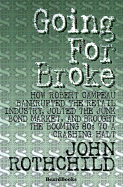
|
Going for Broke: How Robert Campeau Bankrupted the Retail Industry, Jolted the Junk Bond Market, and Brought the Booming 80s to a Crash
By John Rothchild
2000/03 - Beard Books
1893122611 - Paperback - Reprint - 286 pp.
US$34.95
The escapades of such Debtor Barons as Robert Campeau are depicted against the backdrop of national ardor for acquiring debt that characterized the 1980s.
Publisher Comments
John Rothchild vividly portrays the era of the Debtor Barons, the 1980s, when a new breed of undaunted entrepreneurs made untold millions buying companies with virtually no money out of their own pockets. The most astute of these Debtor Barons was Robert Campeau, a Canadian real estate developer, who became a primordial force in the American retail industry. This enticing but sobering book is fascinating reading for anyone who ever had a credit card or applied for a loan.

Review by Gail Owens Hoelscher
From Turnarounds and Workouts, May 15, 2000
Robert Campeau, one of 14 children born to a French Canadian mechanic and blacksmith, invested $5,000 in a modest house under construction in Ottawa in 1949, doing most of the carpentry work himself, Foreseeing the post-war suburb boom, and virtually creating the Ottawa skyline, he went on to build a successful, sprawling $200 million real estate corporation.
Then, riding the tidal wave of leveraged buyouts of the late 1990s, he borrowed $11 billion from Wall Street to acquire Allied Stores and Federated Department Stores, both successful and relatively debt-free retail conglomerates, in hostile takeovers. Fortune magazine called the Federated buy "the biggest, looniest deal ever." Two years later, Allied, Federated, and Campeau Corporation were plunged into Chapter 11 receivership.
Campeau was so many things: risk-taker extraordinaire, earnest, eccentric, endearing, cocky, extravagant, persistent, impetuous, commanding, frenetic, and capricious. He shocked the conservative Canadian business community with his brazenness, flamboyance and quirky ways. In 1980, he showed up at the home of the CEO of Royal Trustco Canada's largest trust company and real estate brokerage, at breakfast time. His English only passable, Campeau told the astonished CEO that he was taking over Royal Trustco that very day. Campeau was summarily thrown out and the major business players in Canada quickly got together and bought up all the outstanding shares of Royal Trustco to thwart his plan.
Campeau was a total stranger to the U.S. investment banking world. His quest had begun with the intention of buying a U.S. bank or S&L. Reading about the hostile takeover of Macy's, however, he abruptly ordered his Canadian financiers to look for a retail company instead. Once in contact with Wall Street, he bemused them with his picturesque and baffling ways of doing business.
Blinded or dazzled by his eccentricities, enticed by the prospect of colossal fees, and caught up in their times, investment bankers assembled the fluids needed for Campeau's adventure into retailing. He drastically overbid for both companies, In the case of Federated, Campeau paid a little over $8 billion for the company, which had had a market value of $3 billion, and borrowed about $7 billion, Allied was worth about $2 billion, but he paid more than $4 billion.
Campeau never found the "synergy between real estate and retail" he promised the shocked and angry management and employees of the two companies. Saddled with enormous debt, Campeau's complete ignorance of the retail industry, his ridiculously high expectations and broken promises, the companies went into a free-fall. Casualties included upward of 10,000 employees laid offal Federated and Allied alone, junk-bond investors, brokerages stuck with bridge loans, other retailers forced to lower their prices as Allied and Federated unloaded inventory, and creditors with claims of over $8 billion.
The first line of Going for Broke reads "This is the story of a marvelous financial calamity." Read on and be amazed, amused, and saddened.

John Rothchild, a Yale graduate and Fulbright Scholar, is a well-known writer
and editor. He has held editorial positions with the New York Times, the St.
Petersburg (Fla) Times, the Washington Post, and the Washington Monthly
magazine. As a writer he has published in numerous national magazines such as
Esquire, the New Republic, Harper's, and the New York Times magazine, to name a
few. From 1995-1996 he was Time magazine's chief financial columnist.
|
